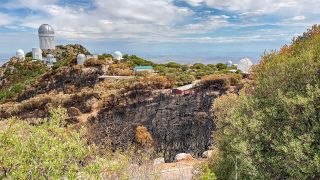After Kitt Peak telescopes' close call with wildfire, essential personnel are returning to evaluate the damage
Astronomers will be trying to assess the extent of the damage, alongside safety crews.

"A great deal of remediation" will be needed at Kitt Peak National Observatory as a few astronomers return to the site to help it recover from wildfire damage, its managing authority says.
Essential personnel are returning to the Arizona observatory to assess the damage caused by a large wildfire that ripped through the mountainous area in June, officials from the National Science Foundation's National Optical-Infrared Astronomy Research Laboratory (NOIRLab), which runs the observatory, said in a statement on Thursday (July 21).
The blaze required firefighting efforts using both helicopters and planes, which kept all the telescope domes on site standing. At least four other buildings fell to the fire. It will take the astronomers' expertise, however, to determine how much damage the facility sustained in the Contreras fire, NOIRLab officials wrote.
"Damage to interiors, especially the telescopes, instruments and other scientific infrastructure, will only be known after the telescope teams are able to spend more time on site," the release stated. "The total cost for restoring the observatory functions is also not yet known."
Related: Satellites watch devastating fires blaze across northern New Mexico
Conditions on the peak are by no means normal. Grid power is unavailable at the site, and likely will remain that way for several weeks as observatory staff work with the Tohono O'odham Utility Authority to put up power lines, utility poles and data services, NOIRLab's statement read.
The road to the observatory is only open to essential personnel in consultation with local emergency crews, the statement added. The public will not be able to visit until normal science operations resume and NOIRLab receives authorization from the Arizona Department of Transportation, officials said.
Get the Space.com Newsletter
Breaking space news, the latest updates on rocket launches, skywatching events and more!






Kitt Peak is not the only astronomy site to face down flames, as wildfires are increasing in frequency and intensity due to ongoing, human-driven global warming. Other observatories have survived close brushes with wildfire before this one.
Examples include a California fire skirting within a few miles of the SETI (Search for Extraterrestrial Intelligence) Institute's Allen Telescope Array in September 2021, and a separate one encroaching near Mount Wilson Observatory, also in California, in September 2020.
Follow Elizabeth Howell on Twitter @howellspace. Follow us on Twitter @Spacedotcom and on Facebook.
Join our Space Forums to keep talking space on the latest missions, night sky and more! And if you have a news tip, correction or comment, let us know at: community@space.com.

Elizabeth Howell (she/her), Ph.D., is a staff writer in the spaceflight channel since 2022 covering diversity, education and gaming as well. She was contributing writer for Space.com for 10 years before joining full-time. Elizabeth's reporting includes multiple exclusives with the White House and Office of the Vice-President of the United States, an exclusive conversation with aspiring space tourist (and NSYNC bassist) Lance Bass, speaking several times with the International Space Station, witnessing five human spaceflight launches on two continents, flying parabolic, working inside a spacesuit, and participating in a simulated Mars mission. Her latest book, "Why Am I Taller?", is co-written with astronaut Dave Williams. Elizabeth holds a Ph.D. and M.Sc. in Space Studies from the University of North Dakota, a Bachelor of Journalism from Canada's Carleton University and a Bachelor of History from Canada's Athabasca University. Elizabeth is also a post-secondary instructor in communications and science at several institutions since 2015; her experience includes developing and teaching an astronomy course at Canada's Algonquin College (with Indigenous content as well) to more than 1,000 students since 2020. Elizabeth first got interested in space after watching the movie Apollo 13 in 1996, and still wants to be an astronaut someday. Mastodon: https://qoto.org/@howellspace